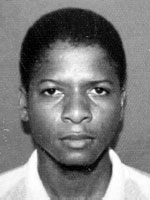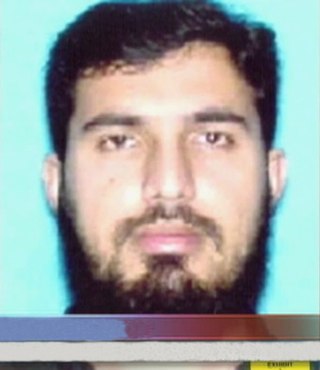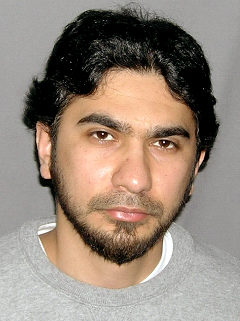Statement of facts from United States Supreme Court Brief, references are to volume and page numbers in the actual trial transcript:
Statement of the Case and Facts
In June 1999, Mr. Al-Turki and his wife/co-Defendant [Sarah Khonaizan] brought Z.A., a 17-year-old Muslim girl from a village in Indonesia, to Saudi Arabia to work for them as a domestic servant at a salary of 600 Saudi riyals (approximately $150) per month (Record 18:60-61, 71-75, 99-100, 102).
In September 2000, the Al-Turkis brought Z.A. to the U.S. (Record 18:124). She was admitted to stay until March 9, 2001, as a "personal or domestic employee." The Al-Turkis kept Z.A.'s passport but failed to renew it, while repeatedly warning her that if she left them she would be arrested (Record 21:28). They also strictly controlled her communications, disallowing her to write letters to her friends (Record 21:80; 22:49; 23:28, 132-134).
Mr. Al-Turki misrepresented Z.A.'s visa status and employment situation to his friends (Record 25:88-89, 262, 307). He also falsely told his secretary at his bookstore that Z.A. was married to a driver in Saudi Arabia (Record 25:184-85). Z.A. was instructed to say that her salary was $800 per month(Record 18:122). In August 2004, she was told that if she was contacted by authorities she should tell them that she had two days off every week, and that her salary was sent to Indonesia (Record 21:73-74,99).
On November 18, 2004, following FBI investigations of Mr. Al-Turki, Z.A. was arrested for overstaying her permit. Mr. Al-Turki and his wife were also arrested for harboring an illegal alien. Initially, Z.A. told authorities what she had been instructed to say by the Al-Turkis regarding her employment situation. Eventually, however, she told the truth, including the fact that she had been paid only $1500 during her entire stay in the United States. She also revealed that Defendant had sexually abused her on a regular basis. [Based on minimum wage, the value of Z.A.'s services during the last three years of her work for the Al-Turkis was $96,044.92 (Env. #6, People's Exh.87a 5162).]
At trial, Z.A. provided a detailed account of Mr. Al-Turki's sexual misconduct. According to her, about once every two weeks, Mr. Al-Turki would go to her room in the basement at night and sexually molest her, including digitally penetrating her and forcing her to perform oral sex on him (Record 19:21-22, 26, 65, 97, 99, 102; 21:41). During the last incident of sexual abuse, which occurred approximately two weeks before Z.A.'s arrest, Mr. Al-Turki, for the first time, had sexual intercourse with Z.A., who was still a virgin (Record 21:44-46).
Afterwards, Z.A. confronted Mr. Al-Turki with a blood-stained tissue, expressing fear that she would become pregnant (Record 21:45). Three days later, Mr. Al-Turki told Z.A. not to worry, that he would not have sexual intercourse with her again, and that she should tell him if she missed her period (Record 21:48). Z.A. kept a diary describing Mr. Al-Turki's sexual abuses. However, prior to Z.A.'s arrest, Mr. Al-Turki told her to destroy it, which she did (Record 21:75-76; 23:109-10).
Two married Muslim women described Mr. Al-Turki's similar acts of sexual misconduct against them, including touching their genitalia and breasts (Record 24:160-71, 180-99).
Mr. Al-Turki's theory of defense, which is repeated in his petition, was that Z.A., under pressure from the FBI and motivated by the desire to get authorization to stay and work in the U.S., had fabricated the allegations (Record 18:44, 50-51, 53-55; Env. #8, Instruction 32). However, Z.A. had disclosed Mr. Al-Turki's abusive conduct to a friend of hers, a Mr. Al-Resheid, more than a year before any contact with the authorities (Record 19:105-06) . [ Mr. Al-Resheid, a subpoenaed witness for the prosecution, left the U.S. on August 16, 2005, and never returned (Record 20:52-54).]
Z.A. never asked for assistance to stay in the U.S. (Record 25:171). Moreover, under the 2000 Trafficking and Violence Protection Act, Z.A. automatically qualified for "continued presence" status, which allowed her to stay and work in the U.S. (Record 25:119-20, 122,125-26), and the process to establish her "continued presence" status started long before she revealed the sexual abuse (Record 25:125). Finally, the FBI agent who helped Z.A. with filling out her necessary forms signed them on April 4, 2005, three days before her revelation (Record Env. #7, Deft's Exhs. E, F; 25:172-88).
Mr. Al-Turki was convicted of false imprisonment, conspiracy to commit false imprisonment, felony unlawful sexual contact (12 counts), criminal extortion, and theft (Record 4: 872-99). He was sentenced to concurrent terms of 20 years to life for the unlawful sexual contacts, an eight-year consecutive term for theft, and shorter terms on the remaining charges to run concurrently with the theft sentence (Record 4:901-02; 5:1250-55; 29:73-76; Supp. Record 31-34).
On appeal, Mr. Al-Turki challenged his convictions on various grounds. In an unpublished opinion, the Colorado Court of Appeals affirmed Mr. Al-Turki's convictions. People v. Al-Turki, 06CA2104,January 22, 2009 (Petition, App. 1a-29a). The Colorado Supreme Court denied certiorari review. Al-Turki v. People, 2009 WL 2916999 (Colo. No. 09SC326, September 14, 2009) (Petition App. 30a-31a).
On April 5, 2010, the United States Supreme Court denied Mr. Al-Turki's Petition for Certiorari.









